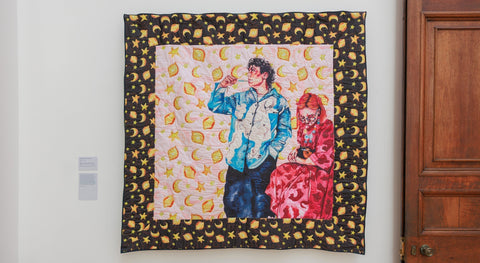Artist Spotlight: Sarah-Joy Ford talks radical curation in Rochdale

Dr Sarah-Joy Ford is a Todmorden based artist and independent scholar working with quilting to explore the complexities and pleasures of lesbian, feminist and queer communities, histories and archives.
Her practice sits at intersection of digital and traditional: using strategies of quilting, digital embroidery, digital print, applique and hand embellishment.
Her work in Soft Power, Domestic Scene in Chorlton, is bright and unwaveringly bold in luscious shades of blue, pink and yellow, claiming a femme aesthetic, which situates the work within histories of gendered marginalisation, and a lineage of artists reclaiming cloth as a powerful language for disrupting discrimination, erasure and hetero-patriarchy.
We asked her about the piece and its origins:
Hi Sarah, your piece in the exhibition is called Domestic Scene in Chorlton. Can you tell us about it?
It was made in 2023 and was commissioned by Derek Horton and Alice Correia for an exhibition called A Tall Order! at Rochdale Art Gallery (now Touchstones Rochdale).
They approached me for this exhibition that was looking at the radical history of curation in the 1980s and 90s, with a particular focus on the curator, Jill Morgan. She was showing art by people in Rochdale that no one else was, and she was supporting artists who were underrepresented and marginalised, and this included queer artists like Rachael Field.
Jill commissioned a solo show in 1991 called Real Lemon: Broadening Out, and this was an exhibition of enormous, glorious oil paintings of lesbian life, mostly portraits of Rachael Field and her partner, Nenagh Watson.
Horton and Correia wanted to contact Rachael, but couldn’t find her. So I said, I bet I can find her and I did – she lived down the road from me.
I was drawn to her [Rachael’s] work, which was called Domestic Scene Whalley Range.
Whalley Range and Chorlton are neighbouring boroughs in Manchester, and her painting domestic scene in Whalley Range was her and her partner in the bathroom with their cat pissing on the floor. I wanted to make my own interpretation of just down the road, another lesbian couple thirty, forty years on, and kind of create this intergenerational legacy of portraits of domestic intimacy.
And what about the lemons?
The lemons represent ‘lemon’ – I didn’t even realise it at the time but apparently it was an insult for lesbians in the 80s and 90s. I thought it just meant silly.
What is your relationship with Rachael like now?
Me and Rachael have kept working together, and we built our own collaboration. We've just applied to be joint research fellows. We've got a journal article coming out. We're an intergenerational team now, and part of my work is to protect her legacy, you know, as a thank you for a gift to me, because she opened up a new places in my art practice, a new approach to painting, a new approach to making, new approaches to thinking. She's inspired and transformed my work in so many ways and we support each other in very, very different ways.
How do you think textiles are viewed in the visual art world and where do you think they fit in?
I mean, things have got better. I think there is an interest in textiles. I think maybe sometimes there's a lack of knowledge and understanding in order of how to take care of textiles, how to show them, a kind of hesitation around showing different kinds of work, and also low standards. Sometimes we all like a bit of sloppy craft. But I think, yeah, there are sometimes tensions at play there.
Would you consider yourself a textile artist? Your piece could be described as a painting of sorts.
This is only the second time my work's been put in a textile exhibition ever. I wouldn't say I was a textile artist, because I'm not part of the textile art world, really.
I've always felt a little bit in the in between spaces, and this is something I've spoken to Alice [Kettle, co-curator of Soft Power] about a lot, and I actually think that's a good place to be.
Wherever I am, I'm sort of on the edge. Often I'll be the only queer person in the room, or I'll be the only textile artist in the room. I'll be one or the other. And sometimes it makes me feel a bit lost, feeling like I don't fit in anywhere particularly. But actually, I think that's a really exciting place to make work and the spaces in between pushing against the boundaries.
You can see A Domestic Scene in Chorlton in Soft Power: Lives told through textile art until 10 August 2025.
Annual Art Pass: £18
Day ticket: £9.90 (inc. Donation)
Concessions: £5.45 (inc. Donation)
Students and under 18s: Free
Image: Alastair Brookes/KoLAB Studios